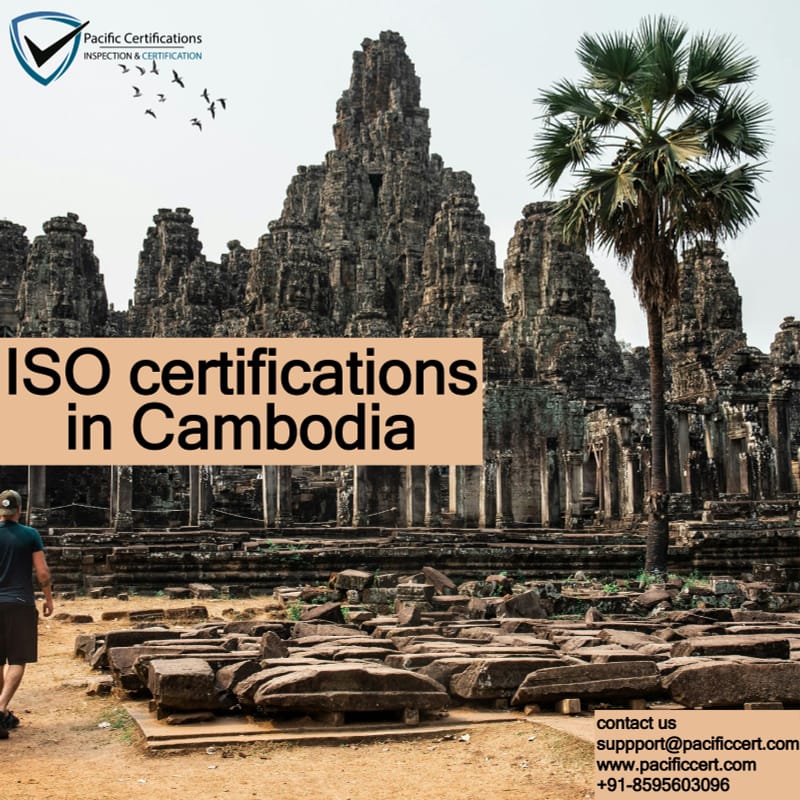ISO certifications in Cambodia, Popular Standards, Requirements and Benefits

Introduction
ISO certifications play a vital role in enhancing the operational efficiency, quality, and safety standards of organizations across various industries worldwide, including in Cambodia. These certifications are not just about adhering to specific standards; they're about establishing a culture of continuous improvement, trust, and reliability among stakeholders, customers, and regulatory bodies.
We at Pacific Certifications serve as a pivotal partner for businesses in Cambodia, guiding them through the journey of achieving and maintaining ISO certifications.
Key ISO Certifications and Applicable Standards
Several ISO certifications are relevant to businesses operating in Cambodia, depending on their industry, operational scope, and objectives. Here are some of the most sought-after ISO certifications and their applicability:
ISO 9001: Quality Management System (QMS)
Applicable to any organization that aims to enhance customer satisfaction through the effective application of the system, including processes for improvement of the system and the assurance of conformity to customer and applicable statutory and regulatory requirements.
ISO 14001: Environmental Management System (EMS)
This standard is relevant for organizations seeking to manage their environmental responsibilities in a systematic manner that contributes to the environmental pillar of sustainability.
ISO 45001: Occupational Health and Safety Management System (OH&S)
Applicable to organizations of all sizes and industries, this standard aims to prevent work-related injury and ill-health and to provide safe and healthy workplaces.
ISO 27001: Information Security Management System (ISMS)
Essential for organizations that wish to manage the security of assets such as financial information, intellectual property, employee details, or information entrusted by third parties.
Click here to find out more applicable standards to your industry
Requirements of ISO Certifications in Cambodia
The requirements for obtaining ISO certifications in Cambodia are essentially aligned with the global standards set forth by the International Organization for Standardization (ISO).
These requirements vary depending on the specific ISO standard being applied for, but generally, they revolve around the establishment, implementation, maintenance, and continual improvement of a management system tailored to the standard’s focus area.
Below, are the outlines of the general process and requirements for some of the most commonly sought ISO certifications in Cambodia, such as ISO 9001 (Quality Management), ISO 14001 (Environmental Management), ISO 45001 (Occupational Health and Safety), and ISO 27001 (Information Security Management).
General Process for ISO Certification
Understand the Standard:
Organizations must first understand the specific requirements of the ISO standard they wish to be certified against. This involves a thorough review of the standard's clauses and annexes, if applicable.
Gap Analysis:
Conducting a gap analysis to determine the current state of the organization’s practices versus the requirements of the standard. This step identifies areas that need improvement or development.
Plan and Implement:
Based on the gap analysis, develop a plan to implement the necessary changes and improvements to meet the standard's requirements. This often involves setting up new processes, training staff, and establishing documentation.
Internal Audit:
Once the system is implemented, conduct an internal audit to check for compliance with the ISO standard and the effectiveness of the implemented system. Identify any areas of non-conformance or opportunities for improvement.
Management Review:
Conduct a management review of the audit findings, system performance, and compliance with the standard. Decide on any necessary actions to close gaps or improve the system.
Certification Audit:
Engage a certified body, like Pacific Certifications, to conduct the certification audit. This audit is typically performed in two stages: a preliminary audit to check the readiness of the organization for certification and a more detailed audit to ensure full compliance with the standard.
Specific Requirements by Standard
ISO 9001 (Quality Management) Requirements:
Requirements focus on customer satisfaction, leadership, engagement of people, process approach, improvement, evidence-based decision-making, and relationship management.
ISO 14001 (Environmental Management) Requirements:
Emphasizes the management of environmental responsibilities in a systematic manner that contributes to the environmental pillar of sustainability, including compliance with applicable laws and regulations.
ISO 45001 (Occupational Health and Safety) Requirements:
Requirements include providing safe and healthy workplaces, preventing work-related injury and ill-health, and continually improving OH&S performance.
ISO 27001 (Information Security Management) Requirements:
Focuses on establishing, implementing, maintaining, and continuously improving an information security management system, including risk assessment and risk treatment processes.
How Pacific Certifications Can Assist?
Pacific Certifications can assist organizations in Cambodia throughout the ISO certification process by:
- Providing training to employees at various levels within the organization to ensure everyone understands their role in maintaining and improving the management system.
- Performing the formal certification audit and issuing the ISO certificate upon successful completion.
For businesses in Cambodia, adhering to these steps and leveraging the support of an accredited certification body like Pacific Certifications can streamline the path to achieving and maintaining ISO certifications, thereby enhancing their marketability, efficiency, and compliance with international standards.
Benefits of ISO Certifications in Cambodia
ISO certifications offer a multitude of benefits to organizations in Cambodia, across various industries, by ensuring that their operations meet international standards for quality, safety, environmental management, and more. These benefits not only enhance the internal processes and efficiency of an organization but also significantly improve its reputation and competitiveness in both local and international markets. Here are some of the key benefits of obtaining ISO certifications for businesses in Cambodia:
Enhanced Operational Efficiency
- Streamlined Processes: Implementing ISO standards helps in streamlining operations and improving efficiency through the adoption of best practices and a focus on quality management principles.
- Reduced Waste: Standards like ISO 14001 encourage organizations to minimize their environmental impact, leading to reduced waste and lower costs.
- Improved Quality: ISO 9001, for example, focuses on quality management systems that enhance product and service quality, leading to higher customer satisfaction.
Marketability and Competitive Advantage
- International Recognition: ISO certifications are internationally recognized, which can significantly boost an organization's credibility and reputation, making it more attractive to customers and business partners worldwide.
- Access to New Markets: Certification can be a prerequisite for doing business in certain sectors or regions, opening up new markets for Cambodian organizations.
- Competitive Edge: Having an ISO certification can distinguish a company from its competitors, offering a competitive advantage in tender processes and when seeking new business opportunities.
Compliance and Risk Management
- Legal Compliance: Adherence to ISO standards can help organizations comply with regulatory and legal requirements, reducing the risk of penalties or legal issues.
- Risk Management: ISO standards like ISO 27001 for information security and ISO 45001 for occupational health and safety provide frameworks for identifying, managing, and mitigating risks.
Enhanced Customer Satisfaction
- Improved Customer Confidence: Customers are more likely to trust and maintain business with companies that adhere to international standards.
- Consistency in Delivery: ISO certifications ensure consistency in the delivery of products and services, which can significantly enhance customer satisfaction and loyalty.
Sustainability and Environmental Management
- Environmental Performance: ISO 14001 helps organizations to manage their environmental responsibilities efficiently, promoting sustainability.
- Sustainable Business Practices: Adopting environmental management standards can lead to more sustainable business practices, which can positively impact the organization's long-term viability and success.
Employee Engagement and Safety
- Workplace Safety: ISO 45001 focuses on creating safer working conditions, thereby reducing workplace accidents and illnesses and improving employee morale.
- Employee Satisfaction: Implementing ISO standards often involves training and engaging with employees, which can increase their job satisfaction and commitment to the organization.
In conclusion, ISO certifications can be a transformative investment for businesses in Cambodia, contributing to enhanced quality, efficiency, marketability, and sustainability. With the support of Pacific Certifications, organizations can navigate the certification process more smoothly and leverage the full spectrum of benefits that ISO standards offer.
Which industries need ISO Certifications in Cambodia?
ISO certifications are versatile and applicable across a wide range of industries due to their focus on quality management, environmental management, information security, and occupational health and safety, among others. In Cambodia, as in other countries, certain industries may find these certifications particularly beneficial, not only for improving internal processes but also for meeting regulatory requirements, enhancing customer satisfaction, and gaining a competitive edge in the market. Here’s a look at some of the industries in Cambodia that might need ISO certifications:
Manufacturing
- Quality Management (ISO 9001): Ensures consistent production of high-quality products.
- Environmental Management (ISO 14001): Helps in minimizing environmental impact and complying with regulations.
- Occupational Health and Safety (ISO 45001): Critical for ensuring the safety and well-being of employees in the manufacturing sector.
Food and Beverage
- Food Safety Management (ISO 22000): Essential for ensuring the safety and quality of food products, from production to consumption.
- Quality Management (ISO 9001): To enhance efficiency and customer satisfaction in food production and distribution processes.
Information Technology and Telecommunications
- Information Security Management (ISO/IEC 27001): Paramount for protecting sensitive information in an era where cyber threats are increasing.
- Quality Management (ISO 9001): To ensure reliable and consistent IT and telecommunications services.
Construction and Real Estate
- Quality Management (ISO 9001): Ensures that construction projects meet customer and regulatory requirements.
- Environmental Management (ISO 14001): Helps manage environmental aspects and ensures compliance with laws and regulations related to construction activities.
- Occupational Health and Safety (ISO 45001): Critical for minimizing the risk of accidents and ensuring a safe working environment on construction sites.
Healthcare
- Quality Management (ISO 9001): Enhances patient care quality and operational efficiency in healthcare facilities.
- Information Security Management (ISO/IEC 27001): Important for protecting patient data and ensuring confidentiality, especially with the increasing digitalization of health records.
Education
- Quality Management (ISO 9001): Can help educational institutions improve their management and operational processes, enhancing the quality of education provided.
Tourism and Hospitality
- Quality Management (ISO 9001): To improve customer satisfaction by ensuring high service standards in hotels, resorts, and tourist attractions.
- Environmental Management (ISO 14001): Encourages sustainable practices in tourism, an important aspect for a country like Cambodia with a rich natural and cultural heritage.
Banking and Financial Services
- Information Security Management (ISO/IEC 27001): Ensures the confidentiality, integrity, and availability of financial data.
- Quality Management (ISO 9001): Improves efficiency and customer service in financial operations.
Logistics and Transportation
- Quality Management (ISO 9001): Enhances efficiency and reliability in logistics and transportation services.
- Environmental Management (ISO 14001): Helps manage environmental impacts of transportation and logistics activities.
Agriculture
- Food Safety Management (ISO 22000): Ensures safety and quality in the production, processing, and distribution of agricultural products.
Conclusion
For businesses in these and other sectors in Cambodia, achieving ISO certification can provide a significant advantage. Pacific Certifications can play a crucial role in this process, offering expertise and support to ensure that organizations not only achieve but also maintain their ISO certifications, leveraging them for continuous improvement, regulatory compliance, and enhanced market competitiveness.
Pacific Certifications is accredited by ABIS, in case you need support with ISO certification for your business in Cambodia, please contact us at [email protected] or +91-8595603096.
Ready to get ISO certified?
Contact Pacific Certifications to begin your certification journey today!
Suggested Certifications –
Read more: Pacific Blogs

